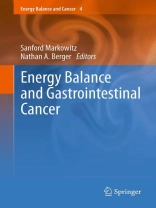The gastrointestinal track provides one of the distinct systems where multiple malignancies, including adenocarcinoma of the pancreas, esophagus and colon are each associated with obesity. This unique association is covered in this volume of Energy Balance and Cancer from the epidemiologic, biologic and potential etiologic viewpoint. The focus on possible dietary contribution as well as the role of exercise in prevention and therapy is presented in both animal model and patient based studies. Special focus is provided also on the role of genetic mutations and inflammatory pathways as drivers of these obesity related gastrointestinal malignancies. Overall, this volume on Energy Balance and Gastrointestinal Malignancies should be valuable to Epidemiologists, Gastroenterologists and Oncologists, as well as to students and researchers from multiple disciplines interested in understanding and disrupting the association between obesity and cancer.
Table des matières
Preface.- Obesity and Gastrointestinal Cancers: Epidemiology.- Genetics of Colon Cancer Susceptibility.- Dietary Modulation of Colon Cancer: Effects on Intermediary Metabolism, Mucosal Cell Differentiation and Inflammation.- The Apc Min/+ Mouse Model to Study the Effects of Exercise on Gastrointestinal Malignancy.- Obesity and the Pathogenesis of Barrett’s Esophagus.- Obesity and Pancreatic Cancer.- Obesity, Insulin Resistance Pathway Factors and Colon Cancer.- Ras/Raf and their Influence in Glycolysis in Colon Cancer.- Energy Balance and Other Modifiable Host Factors on Colorectal Cancer Prognosis.- Cyclooxygenase-2 and Chronic Inflammation: Drivers of Colorectal Tumorigenesis.- Index.












